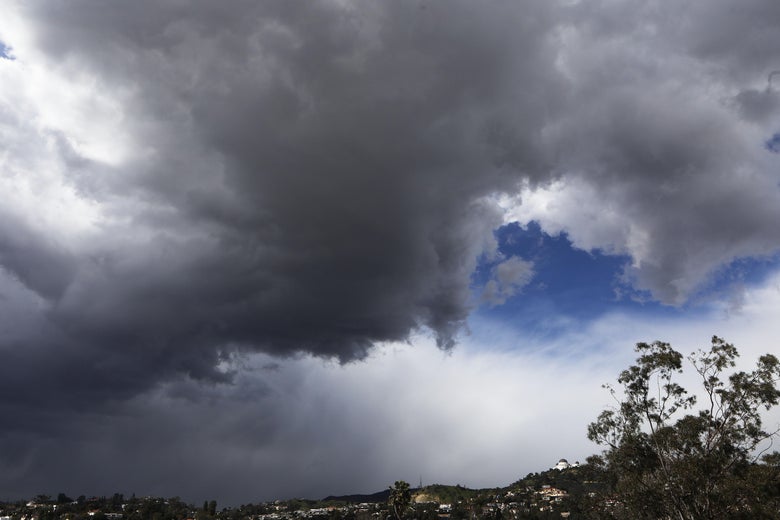
Things may or may not be clearing up.
Mario Tama/Getty Images
You might have read this week that, thanks to climate change (what else), clouds—clouds!—might disappear by the end of the century, which would in turn be very bad for… climate change (what else). This mind-melting news arrived Monday with the publication of a new study in the journal Nature. It is distinctly shareable because of how immediate and visceral its findings are—the mere possibility that we could eliminate clouds is an almost comical demonstration of just how significantly we are currently altering the planet. And not only is imagining a world without clouds intensely bizarre, it would also be quite bad. Clouds currently block a lot of sunlight, helping cool the planet, and if the clouds go, we could find ourselves with runaway warming—much worse than anything we’ve considered thus far—within this century.
It’s all very alarming. Luckily, Natalie Wolchover wrote an exquisite piece for Quanta magazine about what the researchers were trying to understand and what they found. Wolchover tweeted that she’d been working on the piece for a year, and it shows: Her story goes far beyond the cursory study summaries that journalists often write and expertly demonstrates what scientific exploration entails. Far from collapsing the new finding into flat fact, Wolchover’s piece shows that often, with new scientific research and discovery, what we don’t know is just as important as what we do know.
And what we don’t know about the future of clouds is kind of a lot. As Wolchover explains, we know that at various points in history, the Earth’s climate has fluctuated wildly; in prior periods, it’s gotten hot so fast that scientists can’t quite discern what caused the swings. Clouds’ disappearance may have been one factor. As Wolchover writes, “For decades, rough calculations have suggested that cloud loss could significantly impact climate, but this concern remained speculative until the last few years, when observations and simulations of clouds improved to the point where researchers could amass convincing evidence.” One way they’ve collected the data they need to make these calculations is by flying through stratocumulus clouds with “dangling instruments from airplane wings to measure atmospheric conditions and bounce lasers off of cloud droplets.” Compelling science!
Even with this kind of data, though, calculating cloud cover is immensely complicated. As Wolchover points out, “today’s supercomputers cannot resolve grid cells that are smaller than about 100 kilometers by 100 kilometers in area. But clouds are often no more than a few kilometers across.” It’s hard to precisely simulate how clouds differ from place to place and how weather will affect cloud cover. Indeed, many cloud scientists are pushing back on the Nature paper, Paul Vosen reported in Science on Tuesday, because they think the authors inappropriately projected data from a spot that is particularly prone to cloud loss, rather than accounting for how cloud loss might differ from place to place.
Another major unknown? Whether we’ll hit the climate conditions that would make clouds disappear in the first place. The researchers say this will happen when CO2 in the atmosphere hits 1,200 parts per million—roughly three times where we are today. As the Atlantic’s Robinson Meyer put it, “Good news: I think it’s unlikely that atmospheric carbon hits 1200 ppm by the end of the century. Bad news: It’s DEFINITELY not impossible.”
Do all these factors ultimately mean that you don’t have to actually worry about cloud loss? I’d suggest that’s the wrong takeaway. One of the biggest problems inhibiting our understanding of climate change is our inability to grasp exactly how Earth’s intimately connected interplanetary forces will combine with one another to amplify problems—a concept David Wallace-Wells usefully categorizes as “cascades” in his new book, The Uninhabitable Earth. This explanation of uncertainty is also elegantly woven through Wolchover’s piece, and is what makes it so compelling: It’s not saying clouds will disappear; it’s exploring the world in which they might. That possibility is jarring enough, hopefully, to convince us to minimize the chances of a cloudless future.
https://slate.com/technology/2019/02/could-climate-change-make-clouds-disappear-clouds-maybe.htmlBagikan Berita Ini














0 Response to "We Don’t Actually Know What’s Going to Happen to Clouds - Slate"
Post a Comment